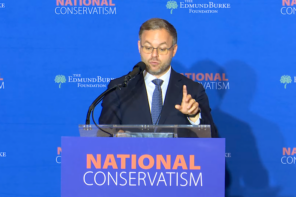It must have been quite a gathering. According to Charisma, more than ninety evangelical leaders met last week in Denver to talk about the upcoming presidential election. After several hours of discussion, and to no one’s surprise, the group decided to shelve their reservations about John McCain and endorse him in the fall campaign.
“The alternative is so bad,” Phyllis Schlafly declared, “we must support John McCain.”
The meeting was called by Mathew Staver, dean of the law school at Liberty University. Those in attendance included Phil Burress, president of Citizens for Community Values in Ohio, Alveda King, niece of Martin Luther King Jr., Donald Hodel, former head of the Christian Coalition and Focus on the Family, and Jim Garlow, pastor of Skyline Church in San Diego. Also present were Rick Scarborough, founder and president of Vision America, and David Barton, president of WallBuilders; both men have fashioned entire careers out of their denials that the founders ever intended church and state to be separate entities.
The meeting (as reported on the website) contained more than the usual over-the-top Religious Right rhetoric of fear. Scarborough warned that an Obama administration would criminalize basic Christian beliefs. Burress asserted that the “difference between McCain and Obama is like the Grand Canyon.” And Garlow warned that California was about to pass a law that would require pastors to perform same-sex marriages.
Despite appeals from younger evangelicals that the leaders of the Religious Right should pay attention to such matters as the environment and various social issues—or at least to give the impression of such concern—the gathering apparently brushed aside the advice. They chose to retain their fixation on same-sex unions and abortion.
The group also trotted out the tired warnings about “judicial activism” as a way of rallying support for McCain (presumably, Barack Obama’s judicial appointments would be “judicial activists”). Am I the only person who finds it a tad curious that whenever conservatives invoke the canard of “judicial activism” they fail to cite the most egregious example of judicial activism in recent years: Bush v. Gore?
And I wonder if anyone at the meeting bothered to point out that from February 1, 2006, when Samuel Alito was sworn in as a Justice of the Supreme Court, until January 3, 2007, when the new Democratic majorities took control of the Senate, the Republican-Religious Right coalition controlled all three branches of the federal government. The chief executive, the majority leader of the Senate and the speaker of the House of Representatives all claimed to be evangelical Christians and unalterably opposed to abortion. Yet, during that eleven-month period, the very people whom the Religious Right had put into office made no attempt whatsoever to outlaw abortion. (They did, however, pass the Military Commissions Act, which authorized the use of torture.)
I wonder if that came up in the course of the deliberations in Denver.
Although the outcome of the meeting, the endorsement of McCain, was predictable, the Denver gathering also illustrates the travails facing leaders of the Religious Right. Aside from Schlafly, none of the old-line leaders of the Religious Right—James Dobson, Pat Robertson, Donald Wildmon, Chuck Colson—were present, which underscores a leadership gap in the Religious Right. True, the ranks of the Religious Right have no shortage of Triple-A aspirants, people like Scarborough and Garlow and Tony Perkins, head of the Family Research Council, itching to move up to the major leagues. But members of the old guard, all of whom are now solidly in their seventies, so far have refused to relinquish their hold on the movement.
Nor is it clear that the rising generation of leadership has the imagination or the fortitude to move beyond the old issues of abortion and homosexuality to embrace other “moral issues” such as the war in Iraq, this adminstration’s persistent use of torture or the despoiling of the environment, God’s creation, in the interest of corporate profits. The failure of the gathering in Denver to transcend the tired playbook coming out of Colorado Springs illustrates both the myopia of the movement and the Religious Right’s paucity of leadership.




